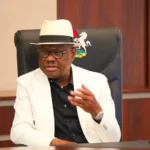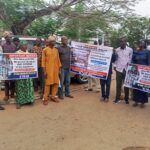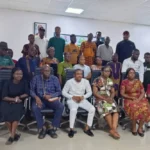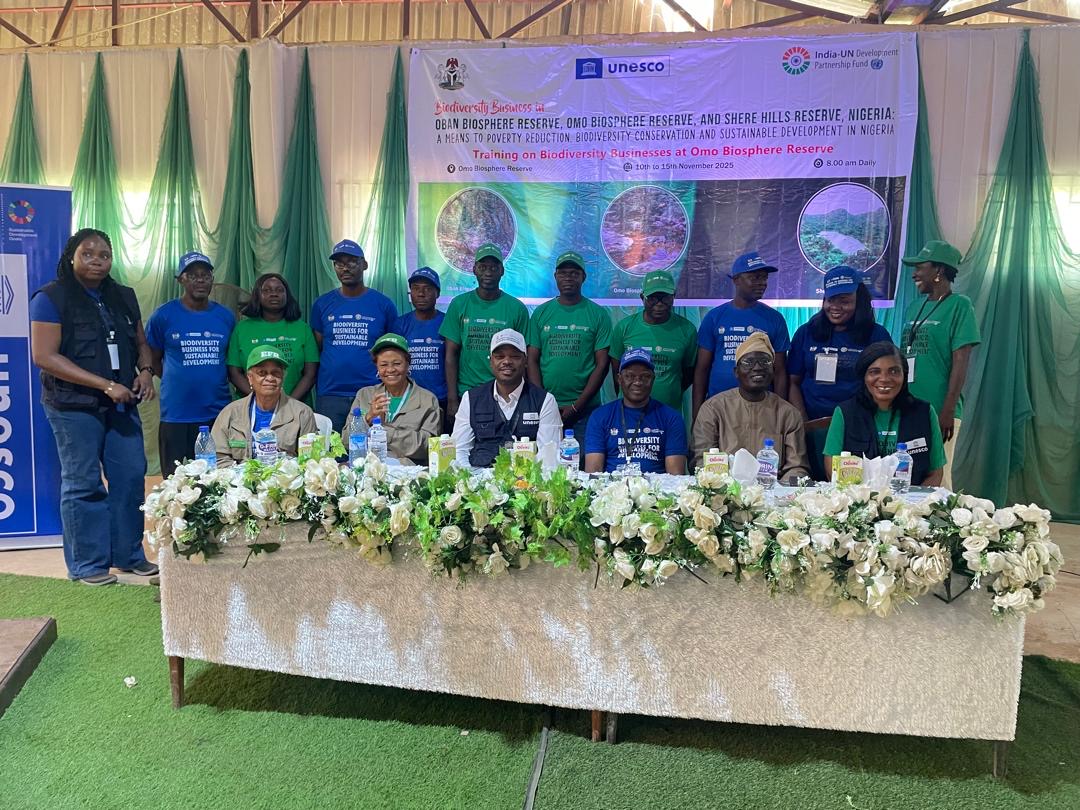By Ijeoma Olorunfemi
The United Nations Educational, Scientific and Cultural Organisation (UNESCO), on Monday commenced biodiversity businesses training for 10 communities around the Omo Biosphere Reserve in Ogun State.
The six-day training, under Nigeria–UNESCO Biodiversity Business Project will ensure that participants from the selected communities are trained on environmental education and biodiversity conservation, fishery and piggery businesses
The programme is funded by India–UN Development Partnership Fund and implemented in partnership with the Ministry of Environment, Forestry Research Institute of Nigeria (FRIN), National Park Service and the Nigerian Man and Biosphere committee.
The programme has as theme ”Biodiversity Business in Omo Biosphere Reserve, Oban Biosphere Reserve, and Shere Hills Reserve, Nigeria: A Means to Poverty Reduction, Biodiversity Conservation and Sustainable Development in Nigeria’’.
Dr Jean-Paul Abiaga, Head of UNESCO, Abuja Office and Representative of UNESCO to Nigeria, said the event would address a key UNESCO priority area; that is balancing between conservation and sustainable development.
According to him, this is especially important today, as the international community strives to protect 30 per cent of the planet’s land and sea by 2030.
”At UNESCO, our philosophy is simple but powerful; to reconcile nature protection with human development within our biosphere reserves.
”We count on continued partnership with the state and local communities to ensure the success of this project.”
Abiaga added that the conservation project initiative was that of courage and should inspire everyone to collectively link conservation with community well-being.
”We encourage you to continue this partnership so that together, we can ensure this project delivers real and lasting benefits for both people and nature.
”UNESCO reaffirms its full commitment to working hand in hand with you to achieve the project’s objectives and to deliver lasting results for the people, the communities and the ecosystems of Nigeria,” he said.
The Minister of Environment, Mr Balarabe Lawal, in his remarks, described the programme as one that would help the communities profit in the sustainable use of natural resources while preserving the environment’s ecological integrity.
Represented by Prof. Zacharia Yaduma, Director-General, FRIN, noted that environmental education was important to promote community responsibility, while business management and livelihoods were essential instruments for attaining sustainability.
”By equipping participants with management and entrepreneurial skills, we are promoting the development of nature-based businesses that enhance local resources, alleviate poverty and promote sustainable production methods.
”This training therefore offers a unique platform to share knowledge, strengthen partnerships, and promote innovative approaches that align with environmental conservation with local economic development,’’ he said.
He urged all participants to actively engage and develop actionable ideas that could enhance livelihood opportunities while preserving their natural heritage.
Dr Enang Moma, National Professional Officer, Natural Science Sector, UNESCO, while recalling the validation workshop for the training held in May said the participants chose two biodiversity-based businesses, piggery and fish farming for selected development.
Moma noted that the goal of the programme aligned with Nigeria’s National Development Plan, 2021-2025 which targeted poverty reduction and contribution to sustainable development and biodiversity conservation in the three country’s reserve.
She added that the training would strengthen the capacity of participants to operate biodiversity businesses and green income generating livelihoods in a sustainable manner as well as reducing anthropogenic activities on the forests and ensuring conservation.
Mr Olukayode Shonibare, Immediate Past Manager, Ogun State Plantation Project, said the state government had invested in replanting indigenous, endangered, exotic species of trees to address deforestation.
”Before now every year we can plant up to 1000 to 2000 hectares with the support from World Bank and African Development Bank, but now that the intervention is no more there, the state government is doing its bit.
”Averagely now, we plant 50 to 100 hectares every year and we are hoping to do more,” he said.
The News Agency of Nigeria (NAN) reports that the benefiting communities include Aba Kurudu, Abeku 1, Etemi, Eseke, Sojukorodo, Owode, Apora, Akorede, Osoko and Mokore. (NAN)
Edited by Deborah Coker












